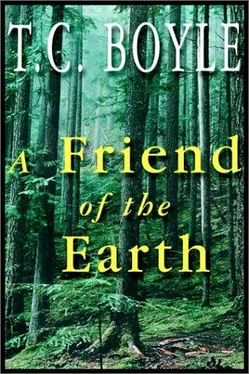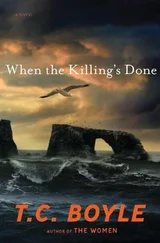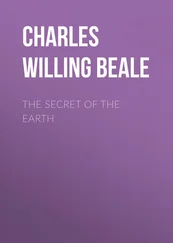They spent the night at a public campground near Yreka, Tierwater dropping off into a dense dreamless sleep the minute he'd unfurled his groundcloth and sleeping bag. It was 3:00 A. M. The sky was open to the stars, not a light showing anywhere, out of the car, low whispers, and that was all till he opened his eyes on ten o 'clock in the morning and Andrea sitting cross-legged beside him. Her face was a deep drenched blue, the color imparted to it by the light sifting through the walls of the tent, and she was studying a map. "You slept like a zombie," she said. "Or no, not a zombie-zombies don't sleep at all, do they?"
He was almost his usual self, and this was his wife, and he loved her. He was almost in Oregon. He was alive. It was the morning of the day on which he was going, to see his daughter, one way or the other.
"Au contraire," he said, "they sleep all day, in their graves. Or for weeks or months at a time. Until the houngan summons them to rise up and commit acts of mayhem, that is. And can you really blame them — the zombies, I mean?" A jay screeched from someplace nearby. He smelled coffee. Heard children-high, colliding voices and running feet. "What does the map say?"
The map said what he already knew: that Titusville was in Josephine County. Period. It didn't indicate whether there was a school there, a gas station, a firehouse or a café where some innocuous tourist or long-lost relative could inquire about farmers who took in foster children. That was all right. He felt good for the first time since he'd stuck his feet in that dark trough of cement-at least he was moving, at least he was doing something. He'd find her. He knew he would. It was the next step he was foundering on: what then? He pictured her out in some cinematic barnyard, all the colors true, geese bobbing, hogs snuffling, and Sierra in the middle of it, pitching hay in a pair of bib overalls in the company of four or five cross-eyed orphans and snub-nosed runaways. And then he saw himself emerging from the car — and he was in her point of view now-emerging from the car in triumph, radiant and tall and unafraid, climbing the fence, striding across the yard and taking her in his arms.
They made Titusville by noon, Tierwater too wrought up to eat breakfast, Andrea placidly munching a stale American cheese on white and washing it down with a Diet Coke as the scenery scrolled by. The town was anonymity itself, fast-food outlets creeping out along the highway, an uneven mouthful of older buildings, hand — lettered signs advertising antiques and going-out-of-business sales, old men on a bench, adolescents clustered around a sleek white convertible. Andrea sauntered into the local gas station and let her halter top do the talking while Tierwater sat hunched in the car, disguised as a timber person (jeans, workboots, plaid shirt and 49ers cap). The car itself was a disguise, a turd-brown Chevy Nova with some damage to both rear fenders, the trunk and the rear bumper, loaned out for the occasion by one of the Los Angeles chapter's volunteers (the housewife, divorced, angry, name of Robin Goldman). He watched Andrea's movements through the crusted window of the garage as she leaned across the counter in black spandex, a refugee from the ballet school in Eugene, and worked the two teenagers there like a fortune-teller. ("You know those foster kids?"" Who, you mean out the Billrays'?" "Who'd you think I was talking about? They're out there past the school, aren't they?"" Uh-huh, second right, Cedar Street." "Big white house?"" Naw, it's blue now. ") It wasn't what Tierwater had been expecting-no farm, no cows, pigs, chickens, goats, not even a dog-just a big shining turquoise house set in a clearing hacked out of the woods. There was a vegetable garden to one side of it, with some sort of plow or rototiller abandoned in the high grass in back of a substantial stand of corn, and a shuttered shed out on the road that advertised SWEET CORN, TOMATOES, SUMMER SQUASH, but nobody, not even a suburban teenager under duress, would describe the place as a farm. A yellow Subaru was parked in the driveway. The windows caught the sun and held it. Nothing moved, not so much as a bird flitting across the lawn or a butterfly suspended over the peonies.
They drove by twice, once at normal speed so as not to arouse suspicion, and then very slowly, falteringly, like the lost tourists they were planning to impersonate. "Go ahead, Ty," Andrea prodded him, "pull into the driveway already — if she's there, maybe we'll see her, signal to her or something. If she's not, she's not. We'll dig some more. Okay? So pull in already."
Tierwater, in this moment of truth, found himself strangely — and sadly-unable to act. He'd brought the car to a stop on the blacktop road just past the driveway, and when he looked over his shoulder to see about backing it up, discovered that there was another car behind him. Directly behind him-right on his bumper, in fact. The driver was an old lady-sixty, seventy, it was all the same to him, senile no doubt, a puff of white hair and some sort of kerchief round her neck. She was just parked there, staring at him, through the outsized lenses of her glasses as if she were at the drive-in waiting for the show to start. He flagged his arm-go on, pass me, I'm just parked here for the rest of my life — but she didn't seem to comprehend the gesture. Out of the corner of his eye he caught movement now up at the house, activity around the Subaru, a kid-not Sierra — and a trim-looking man in a short-sleeved white shirt, slam, slam, the distant soft concussion of both doors shutting simultaneously, followed by the sound of an engine revving. Another gesture for the old lady, but she was planted behind the wheel of the car — a Cadillac of the fin era — and worse, the car was blocking the driveway.
"What now?" Tierwater demanded, his teeth clenched, stomach churning, all the many mountains of shit in the world piled high around him He was looking at Andrea, looking for someone to blame, and she was the prime candidate. By default. "That could be them-that could be them right there-what do I do?"
The Subaru had come to a stop at the end of the drive, two mild faces caught behind the untinted glass of the windshield, looks of mild surprise for the old lady in the Cadillac, but no horn-hammering impatience or big-city sneers, the broadest of neighborly grins already blooming. The trim man — and Tierwater was calculating now-looked to be about thirty, blond hair parted on the left side, a pair of smoked discs clamped over prescription lenses, the sort of thing a building inspector might wear on his day off Next to him was a boy of sixteen or seventeen, eyes gouged into his head as if by the thumbs of a ceramic sculptor, flattop haircut, peach-colored. Andrea stepped out of the car.
"Hello, there," she said, shading her eyes with one hand and shaking out a conciliatory wave with the other. She was moving forward, along the weed-choked ditch that was the shoulder, addressing the windshield of the Subaru rather than the hunched and frozen form of the old lady. "I wonder if you could help us-we seem to've gotten lost. We're looking for" — and here she gave a glance with a smile wrapped round it to the old lady, for form's sake, before coming back to the Subaru- "for the Wilsons' place. Ted and Dodie Wilson?" And then she stopped, just beyond the Cadillac, not five feet from the Subaru's bumper.
The trim man-five eight, one forty-five, ironed right into his clothes-stepped out of the car, the neighborly smile turned up till it could roast meat. The door swung wide, and then the other door creaked open and the boy was standing there on the near side of the car. And what was he? Heavier than Tierwater had thought, meaty arms, the high-school linebacker's neck and shoulders, a look of nullity behind the smile. "The Wilsons?" The trim man said — but let's call him the building inspector, because that's what he was, then and forever, in Tierwater's mind anyway. "Wilkerson I know, and Westons, but nobody named Wilson. Not around here anyways." Turning to the boy. "You know of any Wilsons at school, Donnie?"
Читать дальше












